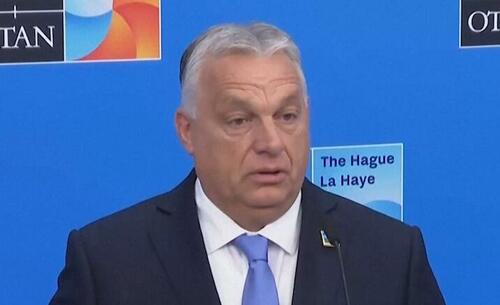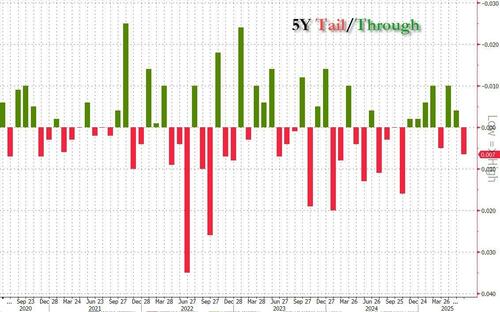
Trump Admin Invokes State Secrets Privilege In Abrego Garcia’s Case
Authored by Sam Dorman via The Epoch Times,
President Donald Trump’s administration has invoked the state secrets privilege as a federal court probes for information surrounding Kilmar Abrego Garcia’s deportation to El Salvador.
U.S. District Judge Paula Xinis revealed the invocation on May 7 in an order requesting briefing from the administration. “The Court requires formal briefing of the Defendants’ invocations of privilege, principally the state secrets and deliberative process privileges,” she said in an order. Her order referenced a court document not publicly available.
The state secrets privilege generally allows the executive branch to protect sensitive national security information from being disclosed in civil suits. The Justice Department invoked it in March in a similar case that more broadly challenged the administration’s use of the Alien Enemies Act to deport individuals to El Salvador.
In that case, the administration said it had deported individuals as part of three flights in March—one of which was carrying Abrego Garcia, a Salvadoran illegal immigrant and suspected member of MS-13, a criminal gang designated as a terrorist organization.
U.S. District Judge James Boasberg held a hearing on the same day as Xinis’s order and requested information on how the administration and El Salvador were handling deportees.
Both he and Xinis have indicated they could hold the administration in contempt for not following court orders. Questions have abounded in recent weeks as to the deportees’ status and how much control the administration had over individuals already removed to El Salvador.
The administration has provided some information through updates to judges, including declarations from government officials.
For example, State Department official Michael Kozak told Xinis on April 21 that the Salvadoran government had informed an ambassador that Abrego Garcia was being held at a penitentiary facility in Santa Ana.
“The Salvadoran government responded on April 21 that Mr. Abrego García is being held at the Centro Industrial penitentiary facility in Santa Ana, ‘in good conditions and in an excellent state of health,’” Kozak said.
Salvadoran President Nayib Bukele notably told reporters during a meeting with Trump in the Oval Office last month that he couldn’t return Abrego Garcia if the United States didn’t want him. According to an interview published by El Grand Continent on May 6, Salvadoran Vice President Félix Ulloa said his country was providing a “service” to the United States.
“So we don’t see this as an issue of international law or international conflict insofar as what we’re doing is providing a service,” he said.
“The status of the detainees or the people who come here isn’t assessed by El Salvador; it’s assessed by the state that requests the service.”
He also said, “We’re providing what we might call prison accommodation. It’s like if a person comes to El Salvador for medical treatment; we have medical tourism for people who come here for dental treatment.”
During Boasberg’s hearing, Department of Justice attorney Abhishek Kambli argued that the administration couldn’t return those deported if El Salvador refused a request to do so. The administration has similarly told Xinis that its hands were tied in returning Abrego Garcia after she issued an order requiring the government to “facilitate” his return to the United States.
After a Supreme Court ruling allowing Xinis to require facilitation, she set up a process of discovery whereby attorneys could probe the administration for whether it followed her order.
Her most recent order scheduled a hearing for May 16 to discuss the publicly unavailable document that she referenced in revealing the administration’s invocation of the state secrets privilege. She’s also weighing a request by multiple news organizations to intervene and unseal court records.
During his May 7 hearing, Boasberg seemed skeptical in response to Kambli’s comments before the court and asked him about various statements members of the administration had made. More specifically, he asked about Trump stating he could secure the return of Abrego Garcia by picking up the phone. He seemed to be referring to an interview with ABC wherein Trump said he “could” get Abrego Garcia back.
The administration, however, has said that Abrego Garcia was a member of the MS-13 gang and would be re-deported if he entered the country again. Abrego Garcia’s attorneys have denied this claim, while Xinis has cast doubt on the evidence behind it.
Kambli suggested to Boasberg on May 7 that Trump was referring to the influence he could have on the Salvadoran government—something he distinguished from the idea that the United States had constructive custody.
The cases have raised multiple legal questions, including about the nature of due process for illegal immigrant deportees and when a president can invoke the Alien Enemies Act.
So far, multiple federal judges have said they thought Trump misapplied the law, specifically doubting that Tren de Aragua’s activity could be considered a foreign invasion under the Act.
The Supreme Court declined on April 7 to rule on that question.
Boasberg, however, indicated on May 7 that he was inclined to agree with the other judges, asking Kambli whether the government’s position was that all those federal judges were wrong.
Tyler Durden
Thu, 05/08/2025 – 11:40

ZeroHedge News
Bitcoin
Ethereum
Monero

Donate Bitcoin to The Bitstream
Scan the QR code or copy the address below into your wallet to send some Bitcoin to The Bitstream

Donate Ethereum to The Bitstream
Scan the QR code or copy the address below into your wallet to send some Ethereum to The Bitstream

Donate Monero to The Bitstream
Scan the QR code or copy the address below into your wallet to send some Monero to The Bitstream
Donate Via Wallets
Select a wallet to accept donation in ETH BNB BUSD etc..















